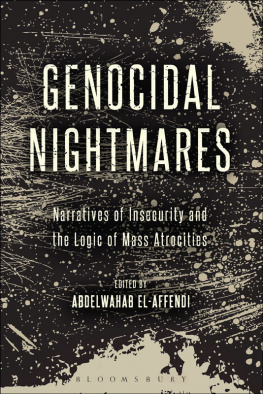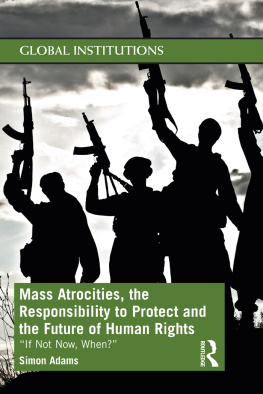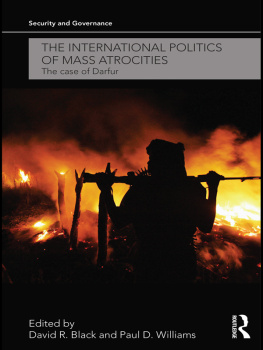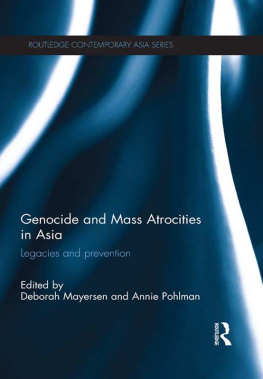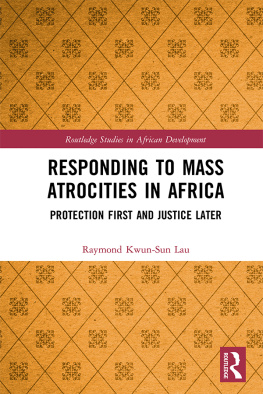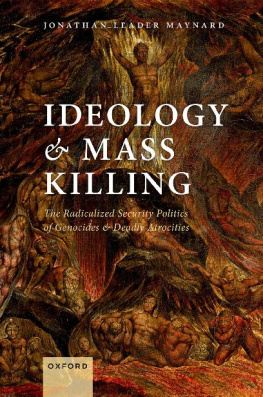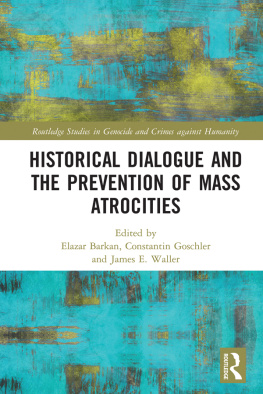The core idea of this book has been under development by the editor since the early 1990s when he published an article entitled: The Eclipse of Reason: the Media in the Muslim World, in which he reflected on the link between the successful suppression of critical narratives and the durability of authoritarian regimes in the Middle East. A few years later, he began to point to a link between the pervasive narratives of fear, mistrust and insecurity and the overall political climate in the region, which did not only permit and entrench authoritarianism, but also encouraged political violence (including mass terrorism).
In this book, this insight is developed further with the help of a number of prominent colleagues, and generalized in an attempt to fill an important gap in our understanding of how mass violence and terrorism link to other political pathologies, including dysfunctional political systems. By bringing together divergent disciplinary perspectives on the link between the construction and dissemination of narratives of insecurity on the one hand, and the production and reproduction of mass violence on the other, the book aims to offer a new explanation of the sudden resort of otherwise normal and rational actors to acts of apparently irrational brutality. The core hypothesis is that when otherwise outrageous actions are framed within plausible and compelling narratives, they appear rational, even imperative, from certain perspectives. The appropriate script can portray the most inhuman act (up to, and including genocide) as not only acceptable, but as humane. One has just to watch a zombie movie to perceive how indiscriminate slaughter can be made to look absolutely a commendable endeavour, or even hilarious!
The book starts with an introductory chapter setting out the theoretical framework for the discussion, and then proceeds to examine case studies, including former Yugoslavia, Sudan, Nigeria, Iraq, India and Israel-Palestine. It also examines the rise of Islamophobia as a distinct narrative of insecurity infecting and threatening otherwise stable democracies.
In addition to raising the important question of mass violence from a novel angle focusing on the role of the narrative construction of insecurity, the book also brings together the work of renowned authors who bring to the endeavour insights from disparate regions of the world, as well as from diverse disciplines and fields of inquiry, including history, philosophy, political science, International Relations, sociology and literary criticism. The authors write from within the communities involved with a couple of exceptions where deep and extensive expertise makes up for it and are thoroughly familiar with the perspectives they are exploring. This includes familiarity with the language, history and the nuances of the discourses being deployed. They thus offer important and deep insights into the questions being tackled and correct some widespread misperceptions about those conflicts.
In a work such as this, one is indebted to such a large number of people and institutions that it is impossible to enumerate these benefactors in such short a space. But we start with the AHRC and ESRC, whose generous funding for this project through the Global Uncertainties Programme was indispensable. Special thanks are due to Dr Chris Wyatt at the ESRC, who has been liaising with me closely throughout the project. I also thank all the contributors, who have been admirable in their dedication and patience. In particular, I thank Dr Francis M. Deng, who has taken time off his busy schedule as Special Adviser to the UN Secretary General on the Prevention of Genocide to read and comment extensively on the draft, adding many important insights in the process.
Thanks are also due to the many colleagues at the Centre of the Study of Democracy (CSD) and the Department of Politics and International Relations at the University of Westminster for their continuous support. CSD has always provided a uniquely stimulating environment for research, enhanced by the generosity of spirit which pervades it. In particular, thanks to Suzy Robson, our dedicated administrator, Simon Joss, Roland Danreuther, Chantal Mouffe, Bhikhu Parekh, John Keane and David Chandler. Special thanks are due to Mona El-Koueidi, my research assistant, who has worked hard at all stages of the research, offering invaluable support. Thanks also to Amr Magdi for his assistance.
Thanks are also due to the anonymous reviewers at the various stages of this work, whose generous and insightful comments have made this work a much better product than it would otherwise have been. Gratitude is also due to our editors at Bloomsbury, in particular the indefatigable Matthew Kopel and Kaitlin Fontana, and all the staff who worked on bringing out this work.
Francis M. Deng
Dr Abdelwahab El-Affendi has produced an edited volume that addresses one of the most daunting challenges for humanity genocide and mass atrocities. He does so with an intellectual rigour and stimulating probing characteristic of his work. From a wide variety of interdisciplinary perspectives, the book poses serious dilemmas that rotate around the philosophical narratives about hate and evil, and their manifestations in genocidal violence and mass atrocities. These are more than nightmares, for people wake up from nightmares with a sigh of relief, while the calamitous consequences of responding to exaggerated and sometimes misconceived nightmarish fears are tragically real.
The normative and moral dilemmas which the book successfully exposes centre on the role of the individual culprit, the communal violence that propels killings to the level of mass atrocities, the contextual dynamics that trigger the frenzy of mass murder, and the luring culture that nurtures a deeper propensity towards the elimination of them that presumptively threaten us. These dynamics are enormously complex and do not lend themselves to easy summation in this brief preface. Whether focus is placed on evil personalities, their evil deeds, mass obedience to the dictates of deranged authoritarian leaders, or the devastating incitement of hostile environments, the moral dilemma in the perception of the perpetrators categorically dichotomizes between the risk of being eliminated by a perceived enemy, and waging a pre-emptive attack aimed at eliminating that supposedly threatening enemy. From the perspective of the victims, to try to explain the source of the threat to address the root causes would be tantamount to condoning the atrocity or dulling the moral outrage, even implying that all of us are potential perpetrators of evil under similar circumstances. On the other hand, countering the perceived threat in kind logically means that responding to genocide must then be genocide, as El-Affendi graphically puts it.
A tragic example of this was reflected in the massacres in South Sudan between the Dinka and the Nuer, triggered by what the government considered a coup attempt on December 15th, 2013, and the opposition leaders attributed to clashes within the Presidential Guard. The interethnic violence that followed rapidly spread beyond the capital, Juba, to several states in the country. While investigations into what happened are still being conducted, and hostilities continue, this is a double tragedy, given that South Sudan had suffered half a century of devastating wars, including mass atrocities of historic proportions.


